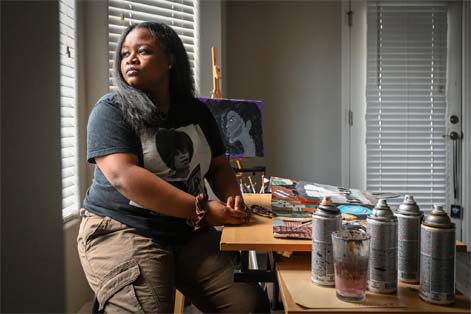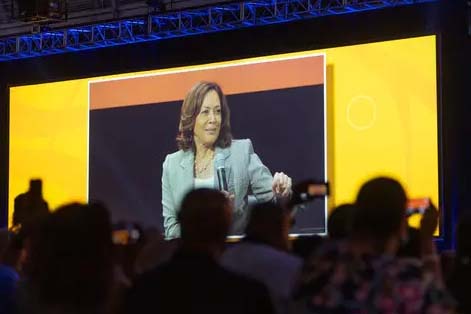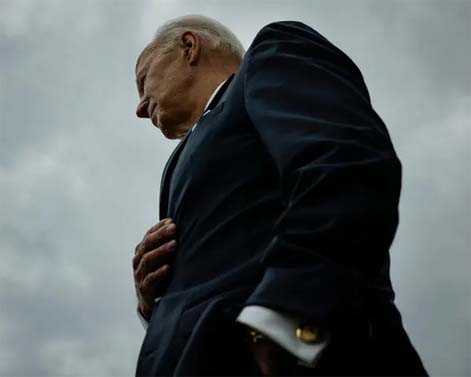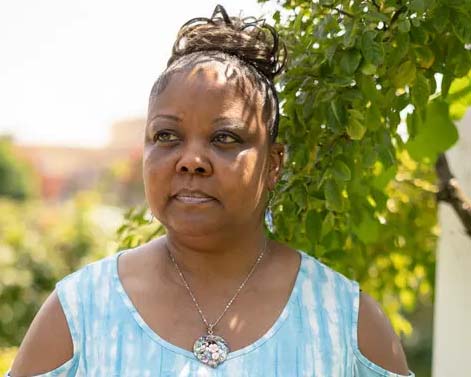|
|
|
|
|
|
 |
|
|
Maeia
Corbett
at a
table
with
paintings.
She is
wearing
a dark
shirt
and
brown
pants.
She had
been
banking
on
President
Biden’s
promise
to
cancel
up to
$20,000
in
student
loan
debt for
millions
of
borrowers.
Credit...Kate
Medley
for The
New York
Times |
| |
Biden
Looks
for New
Ways to
Energize
Black
Voters
By Erica
L.
Green,
and
Zolan
Kanno-Youngs
nytimes.com
With
much of
his
racial
equity
agenda
thwarted
by
Congress
or the
courts,
President
Biden is
trying
to close
an
enthusiasm
gap
among
the
voters
who
helped
deliver
him to
the
White
House.
During a
recent
town
hall
with the
Congressional
Black
Caucus,
Vice
President
Kamala
Harris
offered
a gut
check to
the 200
people
who had
gathered
to take
stock of
the
state of
civil
rights
in
America.
“We are
looking
at a
full-on
attack
on our
hard-fought,
hard-won
freedoms,”
Ms.
Harris
told the
crowd,
which
erupted
in
applause
as she
spoke.
“So much
is at
stake,”
she said
of the
2024
presidential
election,
“including
our very
democracy.”
In 2020,
President
Biden
promised
Black
voters
he would
deliver
a
sweeping
“racial
equity”
agenda
that
included
a
landmark
federal
voting
rights
bill,
student
loan
relief,
criminal
justice
reform
and
more.
Three
years
later,
with
much of
that
agenda
thwarted
by
Congress
or the
courts,
the
White
House is
looking
for new
ways to
re-energize
a
crucial
constituency
that
helped
propel
Mr.
Biden to
the
presidency.
That
means
describing
the
stakes
of the
election
in stark
terms,
as Ms.
Harris
did over
the
summer
in
Boston,
arguing
that the
Republican
Party is
trying
to
reverse
generations
of
racial
progress
in
America.
But Mr.
Biden is
also
asking
voters
to judge
him on a
series
of
achievements
that
benefit
Black
Americans
— but
that are
hardly
the
marquee
promises
from the
early
days of
his
administration.
In
recent
weeks,
the
Biden
administration
has gone
out of
its way
to
highlight
its
economic
accomplishments,
which
include
the
lowest
Black
unemployment
rate on
record
and the
fastest
creation
rate of
Black-owned
small
businesses
in over
25
years.
It has
pointed
to
social
policy
efforts,
such as
increased
enrollment
in
Obamacare
and
closing
the
digital
divide,
as
examples
of real
impacts
on the
Black
community.

Vice
President
Kamala
Harris
on a
projection
screen
in front
of a
crowd.
Harris
has
defended
the
administration’s
racial
equity
policies.Credit...David
Degner
for The
New York
Times
In an
opinion
essay
published
on
Sunday
in The
Washington
Post,
marking
the 60th
anniversary
of the
March on
Washington,
Mr.
Biden
said his
stewardship
of the
economy
— a top
concern
among
Black
voters —
was
helping
to
fulfill
the
nation’s
promise
of
equality.
The
president
wrote
that his
administration
was
“advancing
equity
in
everything
we do
making
unprecedented
investments
in all
of
America,
including
for
Black
Americans.”
Administration
officials
acknowledge
that
some of
those
advances
may not
immediately
resonate
with a
population
that
sees its
constitutional
rights
under
assault.
While
polls
show
continued
strong
support
for Mr.
Biden
among
Black
voters,
there
are
growing
concerns
about an
enthusiasm
gap
among
the most
loyal
constituencies
in the
Democratic
Party.
Neera
Tanden,
Mr.
Biden’s
domestic
policy
adviser,
said the
president
was
focused
on
dismantling
inequities
that had
been
embedded
for
decades.
“I think
we’ll
have a
transformative
change,”
Ms.
Tanden
said,
pointing
to
executive
orders
Mr.
Biden
signed
in his
first
days in
office,
which
directed
federal
agencies
to
consider
racial
equity
when it
comes to
the
distribution
of money
and
benefits.
But, she
added,
“it
won’t be
something
millions
of
people
feel in
a
minute.”
For
Black
Americans
like
Maeia
Corbett,
the
promises
of
future
benefits
ring
hollow.
“Looking
at these
promises
that
this
administration
has
made,
it’s
like a
whirlwind,”
said Ms.
Corbett,
27.
“What
can I
grasp
onto
when all
of these
things
are
being
taken
from
me?”
Ms.
Corbett,
who
graduated
from
college
just
months
before
the
coronavirus
pandemic
brought
student
loan
payments
to a
pause,
had been
banking
on Mr.
Biden’s
promise
to
cancel
up to
$20,000
in
student
loan
debt for
millions
of
borrowers.
When the
Supreme
Court
ruled in
June
that Mr.
Biden’s
plan was
unconstitutional,
Ms.
Corbett,
like
many
Black
Americans,
felt a
familiar
sting of
disappointment.
The fact
that the
decision
came
just 24
hours
after
the
court
struck
down
affirmative
action
in
college
admissions,
a
longstanding
mechanism
for
economic
and
social
mobility
for
Black
people,
was
almost
disorienting.
“It’s
like you
get to
the
steps of
equity
and the
steps
are torn
down,”
she
said.
Ms.
Corbett’s
sentiments
are a
warning
sign for
the
president,
who has
tied the
success
of his
presidency
to
racial
progress.
Mr.
Biden
has said
he would
use the
power of
his
office
to
address
inequity
in
housing,
criminal
justice,
voting
rights,
health
care,
education
and
economic
mobility.
“I’m not
promising
we can
end it
tomorrow,”
Mr.
Biden
said in
January
2021.
“But I
promise
you:
We’re
going to
continue
to make
progress
to
eliminate
systemic
racism,
and
every
branch
of the
White
House
and the
federal
government
is going
to be
part of
that
effort.”
Melanie
L.
Campbell,
the
president
of the
nonpartisan
National
Coalition
on Black
Civic
Participation,
said
Black
women —
widely
credited
with
securing
Mr.
Biden’s
win —
could
see
tangible
progress
in
historic
appointments
of Black
women to
cabinet
positions
and the
federal
judiciary,
including
Ketanji
Brown
Jackson
to the
Supreme
Court.
But the
courts,
conservative
activists
and a
bitterly
divided
Congress
have
curtailed
a lot of
Mr.
Biden’s
agenda.
Lawsuits
have
held up
the
administration’s
efforts
to
forgive
the
debts of
Black
and
other
minority
farmers
after
years of
discrimination.
Congress
has
blocked
two
signature
pieces
of
legislation
Mr.
Biden
championed,
the
George
Floyd
Justice
in
Policing
Act and
the John
R. Lewis
Voting
Rights
Advancement
Act. And
conservative
groups
have
vowed to
pursue
legislation
challenging
Mr.
Biden’s
plans to
prioritize
race-conscious
policies
throughout
the
federal
government.
Now,
with
aides
describing
him as
frustrated
over the
setbacks,
Mr.
Biden is
taking
pains to
cast the
election
as a
choice
between
his
agenda
and the
extremism
of “MAGA
Republicans,”
or those
loyal to
former
President
Donald
J.
Trump.
“My dad
used to
say:
‘Joey,
don’t
compare
me to
the
Almighty.
Compare
me to
the
alternative,’”
Mr.
Biden
says in
a common
refrain.
Cedric
Richmond,
a
co-chairman
of the
Biden
campaign,
said the
campaign
would
emphasize
that Mr.
Biden
should
not be
blamed
for the
Supreme
Court
decisions.
“It’s
the
court
that
just
rolled
back
equity,
and
we’re
going to
point to
it,” he
said.

President
Biden
wearing
a dark
suit and
a white
shirt.
The
Biden
administration
has
pointed
to
social
policy
efforts
as
examples
of real
impacts
on the
Black
community.Credit...Samuel
Corum
for The
New York
Times
A
recent
Axios
survey
of more
than 780
college
students
and
recent
graduates
found
that 47
percent
of
voters
blamed
the
Supreme
Court
for
student
loans
not
being
forgiven,
38
percent
blamed
Republicans
and 10
percent
blamed
Mr.
Biden.
Still,
polls
show
that
Black
voters
under 30
have far
less
enthusiasm
for Mr.
Biden
than
their
elders
do.
Mary-Pat
Hector,
the
chief
executive
of Rise,
a
student
advocacy
organization
that has
pushed
for
student
debt
relief
and
college
affordability,
said the
disillusionment
among
young
voters
was
real. On
issues
like
student
loan
debt and
climate,
Ms.
Hector
said,
all the
voters
see are
“things
we were
told
were
going to
happen
that
just
haven’t
happened.”
“When it
comes to
Gen Z,”
she
said,
“they
don’t
forget,
and it’s
hard for
them to
forgive.”
In the
meantime,
the
White
House
says it
has not
given up
on its
most
ambitious
goals.
This
month,
the
Education
and
Justice
Departments
released
guidance
for how
colleges
should
navigate
the
affirmative
action
decision,
urging
them to
continue
to
strive
for
diversity.
And the
Education
Department
is
preparing
to start
new loan
programs,
while
delivering
billions
in loan
relief
by
fixing
existing
programs
that
have
long
disenfranchised
Black
borrowers.
And
dozens
of
federal
agencies
are
working
through
“equity
action
plans”
tackling
everything
from
disparities
in home
appraisals
to
maternal
mortality.
Stephen
K.
Benjamin,
Mr.
Biden’s
director
of
public
engagement,
said he
believed
the
administration’s
economic
record
would
resonate,
even as
he
acknowledged
that the
White
House
needed
help
from
Congress
to make
good on
its
broader
agenda.
“I do
believe
when the
rubber
hits the
road,”
he said,
“people
will pay
more
attention
to these
dramatic
investments
in their
quality
of
life.”
Lennore
Vinnie,
53, said
she felt
the
administration
was
looking
out for
people
like
her.
Having
benefited
from
affirmative
action
when she
entered
the
white,
male-dominated
information
technology
field in
the
1990s,
Ms.
Vinnie,
a single
mother
of two,
incurred
$280,000
in
student
loan
debt
after
years of
pursuing
a
doctoral
degree
to
advance
to a
senior
leadership
position.
Some of
the debt
was
acquired
at
predatory
for-profit
colleges.

Lennore
Vinnie
is
applying
for loan
relief
through
forgiveness
programs
that
were not
affected
by the
Supreme
Court
ruling.Credit...Carlos
Bernate
for The
New York
Times
“I know
for me,
as an
African
American
woman,
you can
never
have too
many
degrees
or too
many
credentials,”
she
said,
“because
that way
I take
away all
your
reasons
for not
putting
me in
the
position.”
Ms.
Vinnie,
who
ultimately
obtained
her
doctorate
and her
promotion,
is
applying
for
relief
through
loan
forgiveness
programs
that
were not
affected
by the
Supreme
Court
ruling.
Ms.
Harris’s
appearance
before
the
Congressional
Black
Caucus
in
Boston
encapsulated
the
administration’s
strategy
moving
forward:
highlighting
its
progress
while
rallying
a
community
to
remember
— and
repeat —
history.
In
Boston,
the
crowd
was
rapt,
shouting
“preach!”
as she
called
out
“extremist
so-called
leaders”
who
sought
to
distract
from the
nation’s
legacy
of
slavery
and
systemic
racism.
Ms.
Harris
then
reminded
the room
that
Black
voters
drove
Mr.
Biden to
win the
presidency
in 2020,
and made
her the
first
Black
vice
president.
“The
future
of
America,”
she
said,
“has
always
relied
on the
folks
who are
in this
room.”
Zolan
Kanno-Youngs
is a
White
House
correspondent
covering
a range
of
domestic
and
international
issues
in the
Biden
White
House,
including
homeland
security
and
extremism.
He
joined
The
Times in
2019 as
the
homeland
security
correspondent.
More
about
Zolan
Kanno-Youngs
|
|
|
|
|
|
|
|
|